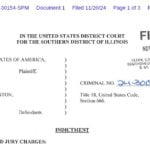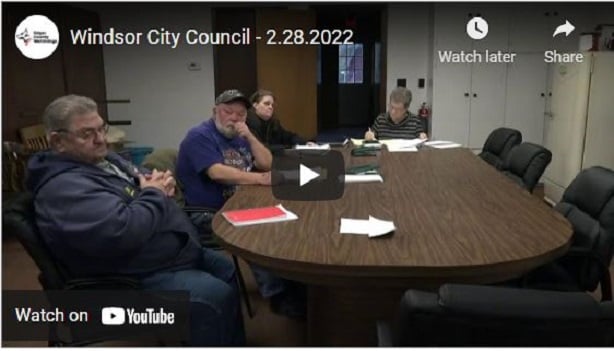Windsor, IL. (ECWd) –
On February 28, 2022, the City of Windsor held a meeting we believe was in violation of the Open Meetings Act (“OMA”), even if their attorney was present and telling them it complied with the Act.
Short version:
- Windsor’s 5-member board (“corporate authority”) consists of the mayor and 4 aldermen.
- The mayor and one alderwoman resigned from office
- City attorneys think that means it is now a 3-member board (she is wrong)
- There are now 3 members of the 5-member board currently in office – which is still a quorum of the 5-member board
- To hold a meeting permitting a board member to attend remotely, there must be a quorum (of the 5-member) board physically present at the meeting location
- To hold a meeting permitting a board member to attend remotely, the city council must have previously adopted rules permitting remote attendance in advance of the meeting in question
- The remaining 3-member quorum of the city council cannot meet unless all three of them are physically present at the meeting location
- Windsor City Council met, with 2 members physically present at the meeting location
- The third member, which would make the quorum, was out of town and attended remotely without a quorum physically present at the meeting location and without any adopted rules of the city of Windsor permitting remote attendance
- This violated the Open Meetings Act and the Illinois Municipal Code, was not a legitimate meeting, and each and every Motion passed at this meeting could be invalidated as a result of those OMA violations
Explanation of why the meeting was an illegal meeting and why the actions taken could be invalidated.
The Illinois Municipal Code provides for situations where there is not a quorum of the public body remaining in office. See Section 3.1-10-55, where it permits less than a quorum to meet for the express purpose of appointments to fill vacancies of municipal office holders. Please note there is no other situation found in the OMA or the Municipal Code permitting anything less than a quorum physically present at a meeting (other than the recent pandemic-related remote meetings) to pass any measure other than appointments to vacant offices:
“(65 ILCS 5/3.1-10-55) (from Ch. 24, par. 3.1-10-55)
Sec. 3.1-10-55. Quorum to fill vacancies. If there is a vacancy in an elective office and, for any reason, there is not a quorum in office of the corporate authorities, appointments to fill vacancies may be made or confirmed by a majority of the corporate authorities holding office at the time the appointment is made or confirmed.
(Source: P.A. 87-1119.)”
We had previously reported that the mayor and a city alderman (his daughter) resigned from office, which left two of the five elected office seats vacant. There are three remaining officeholders on the 5-person board, which makes a quorum of the public body.
At the previous meeting (February 21, 2022 – watch it HERE), the attorney advised the board there was no quorum at the location of the meeting, rendering them unable to conduct a meeting according to the OMA. The attorney was correct during that meeting. We asked if they had a policy permitting remote attendance, which they did not produce, and instead of answering the question, the attorney cited the OMA’s requirement of having a quorum present at the location of the meeting in order to permit remote attendance (this is a different situation than the recently passed amendment permitting remote attendance during a declared emergency).
This Feb 28 meeting had the exact same issues: three remaining members of the board, with one of those members out of town and unable to attend in person, and apparently no adopted rules permitting remote attendance.
When questioned, the attorney stated the State Statute was the rule (watch this at 19:52 in the below video), and we agree, which is why this meeting violated the law – because of the state statute’s requirements of a quorum being physically present at the meeting location.
Requirement of a quorum to be physically present at the meeting location
Section 2.01 of the Open Meetings Act: “Except as otherwise provided in this Act, a quorum of members of a public body must be physically present at the location of an open meeting.”
It does not say a quorum of the members currently holding office, it says quorum of the members of the public body, and the city of Windsor has a 5-member public body. Any other interpretation is a bastardization of the OMA and Municipal Code and would lead to absurd results.
The clerk and attorney advised the residents they contacted Mr. Cole at the Illinois Municipal League who allegedly told them it was OK to hold a meeting with one of the remaining three officials remotely attending (we have serious doubts if he ever tendered such advice). They also indicated they contacted the Shelby County State’s Attorney who allegedly instructed them to follow the advice of their attorney.
Open Meetings Act’s requirements permitting remote attendance at a public meeting
“Sec. 7. Attendance by a means other than physical presence.
(a) If a quorum of the members of the public body is physically present as required by Section 2.01, a majority of the public body may allow a member of that body to attend the meeting by other means if the member is prevented from physically attending because of: (i) personal illness or disability; (ii) employment purposes or the business of the public body; or (iii) a family or other emergency. “Other means” is by video or audio conference.”
There was no quorum of the 5-member board physically present at the meeting location. The quorum requirement does not change simply because one or more members of the public body resign – it remains a 5-member board.
Open Meetings Act’s requirement of having adopted rules, prior to permitting remote attendance
“Sec. 7(c) A majority of the public body may allow a member to attend a meeting by other means only in accordance with and to the extent allowed by rules adopted by the public body. The rules must conform to the requirements and restrictions of this Section, may further limit the extent to which attendance by other means is allowed, and may provide for the giving of additional notice to the public or further facilitate public access to meetings.”
There are no apparent adopted rules of the City of Windsor permitting remote attendance of board members.








6 Comments
Golden Country
Posted at 08:31h, 10 MarchThank You John Kraft I thought from your post there was another procedure or process you knew that the Village could have used to insure that payroll was met and bills were paid.
Golden Country
Posted at 19:16h, 08 MarchJohn Kraft Please tell what are the other ways to comply with both laws.
John Kraft
Posted at 20:25h, 08 MarchHave a quorum physically present at the meeting location.
John K
Posted at 12:21h, 07 MarchDon’t know enough about the Open Meetings Act to comment, but do know that if the certain employees hadn’t been paid, it’d violatied the Federal Fair Labor Standards Act.
John Kraft
Posted at 18:28h, 07 MarchWe understand that but violating one law to comply with another doesn’t work.
There were other ways available to comply with both laws, they chose the wrong way – because they listened to their attorney’s bad advice.
John K
Posted at 23:26h, 07 MarchIIRC, the Federal Fair Labor Standards Act calls for trebel damages. Miss a $1,000 paycheck for a police officer and the Village pays $3,000 in fines. Plus the original $1,000. Sounds like the Kobayashi Maru.